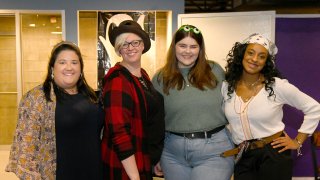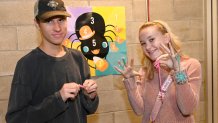
There’s a place for everyone in the world of theater.
That is the premise of the Penguin Project, a free educational program that pairs aspiring artists with special needs and disabilities with typically developing peer mentors to create a unique and theatrical experience as they perform Broadway musicals. WaterTower Theatre is the newest partner of the Penguin Project and the fifth chapter in Texas.
This program resonates with Shane Peterman, WaterTower Theatre’s Producing Artistic Director, and Ashley Puckett Gonzales, WTT Penguin Project Program Director. Peterman has a prosthetic leg and Gonzales worked as an aide in her high school’s special education department when she was a teenager. Both artists are parents of neurodiverse children and recognize how theater can bring the whole family together.
“This really speaks to me,” Peterman said. “Yep, this is it. This is our new children’s programming at WaterTower Theatre.”
Get DFW local news, weather forecasts and entertainment stories to your inbox. Sign up for NBC DFW newsletters.
“It is very isolating and very hard for a lot of these kids and their parents to make friends,” Gonzales said.
Dr. Andy Morgan, Professor Emeritus of Clinical Pediatrics and the former Head of the Division of Child Development at the University of Illinois College of Medicine, founded the program in 2004, combining his professional expertise with his passion for theater to give children with disabilities an opportunity to experience the performing arts.
“He observed in theater how it builds so much confidence and so many wonderful things,” Gonzales said. “I think he saw how that could help developmentally with his knowledge of what these children need, seeing it as the perfect vehicle.”
The Scene
Parents involved in the pilot program in Illinois encouraged Morgan to create a replication process to help spread the program throughout the nation. The key to the success of the program is pairing the young performers of varying abilities, creating an environment where they are helping each other.
“It does help build that social structure. It does help kids relate to each other,” Gonzales said. “It also builds so much empathy and character in the kids who are helping.”
The program creates an environment where everyone’s talents are valued. All participants range in age from 10 -18. Artists are children and young adults with disabilities, including cognitive, learning, motor, visual, and hearing impairments, genetic disorders, and neurological disorders and neurodiversity. Peer-Mentors are typically developing children and young adults who will be matched with an artist to work with them throughout the rehearsal and performance process.
“It means that nobody is alone. It means nobody is left out. It means nobody feels like the last kid picked for the team. Everybody has got somebody. I think it’s a really beautiful way to do it,” Gonzales said.
The program started with informational meetings and an introductory Halloween event.
“The kiddos that we have so far are so passionate. We had a get-together the other night and I got to meet them, and they are just such impressive young people,” Gonzales said.
The program will culminate in a production of Annie, Jr., scheduled to be performed on the Terry Martin Main Stage at the Addison Theatre Centre this spring. Although rehearsals began this month, there's still time for aspiring artists and mentors to join the program. The rehearsal schedule includes breaks for the holidays. A team of theater professionals will help guide the cast through the rehearsal process.

“We make whatever accommodations are necessary for each child,” Puckett said. “Part of it is just rolling with stuff and making sure that you go, ‘It’s okay. We’re just going to stay calm and we’re gonna breathe and it’s going to be okay. If you need to step away, you can step away. If you don’t want to say that line today, you don’t have to say that line today.’ It’s about keeping the focus on that this is about the experience. And though, yes, we do want to have a good show, that’s not the ultimate goal. The ultimate goal is for us to have a really good time and gain the things that theater can give us.”
Peterman and Gonzales hope these young artists will discover the accepting and joyful community of theater.
“I never once felt like I wasn’t fully supported as a person with a disability in the theatrical arts. Not once.” Peterman said. “When you look at the joy of the approach and the ability that comes out of these young people having the ability to do that is such a huge life lesson for all of us.”
“There’s so much enthusiasm and joy in being involved,” Gonzales said.
“We all have something different about us. We all have our issues. We all have our own trauma,” Peterman said. “We should all understand we are all on common ground. If we just take it one relationship, one moment, one step, one hug, one rehearsal, one note at a time and we just pay attention to whatever that is as we journey forward together, then we are better because we did it together.”
Learn more: WaterTower Theatre



